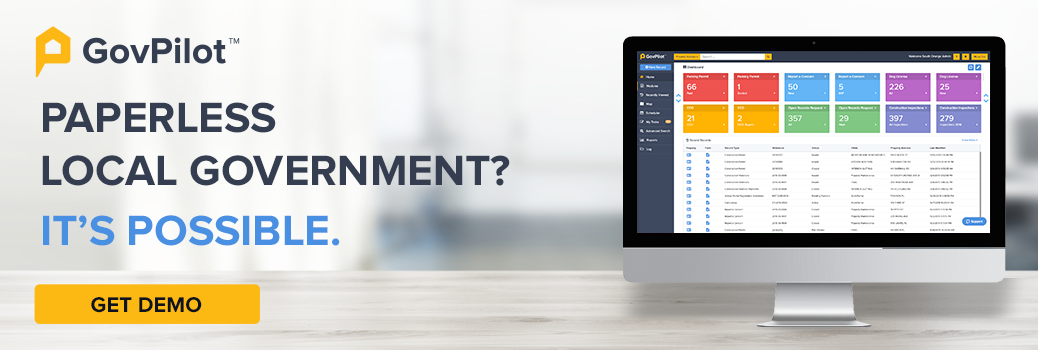New Jersey recently announced its 2023-2025 IT Business & Technology Plan with the goal of modernizing the state government’s digital infrastructure using cloud data storage.
This extensive new IT plan proposes using the cloud for integrating state government data across agencies and providing a better, consistent user experience across government websites and applications.
But what specifically is in the NJ strategic IT plan? And what does it mean for local governments? While the document outlines requirements for state government entities specifically, the innovative government IT strategy laid out in the document boasts great recommendations for local governments in NJ (and any state) looking to take their antiquated computers systems to a modern standard.
Follow along for key takeaways from the NJ IT plan that can be applied within your locality for better data storage, digital citizen services, and online communications across departments utilizing government software.
What is the NJ IT Business & Technology Plan?
The NJ IT Business & Technology Plan is a document released by the NJ Office of Information Technology in February 2023 with the goal of leveraging technological innovations to improve economic development, citizen engagement, and workforce performance through the modernization of technology systems across the state.
The plan calls for the analysis of data silos across state government agencies and action to break these silos down by universally moving to the government cloud and providing a common user experience on digital platforms across state departments. Governor Phil Murphy and the state Executive Branch are aiming to implement the goals laid out in the document by the end of 2025.
Follow along for specific takeaways from the document that can be applied in local governments for better workflows and organization.
What Actionable Lessons Are Included in the NJ IT Plan?
NJ is utilizing this strategic plan to innovate with government technology. Problems that were exacerbated by the pandemic are now being addressed to provide better government services and keep critical data secure and accessible.
Here are the critical components of the plan that local governments can learn from:
1. Common User Experience
As explained in the GovTech article highlighting the plan, “the IT plan, in part, tackles issues stemming from pandemic response, when the state hurried to launch digital services to meet new needs and did not prioritize a common user experience.”
As citizens grow more accustomed to digital applications playing a role in their day-to-day lives like Uber, Doordash, Venmo, etc. low-quality and dramatically differing government websites and apps can be confusing and frustrating for your citizens trying to submit applications, pay government fees or fines, schedule inspections, and more.
How Can Local Governments Improve UX?
GovPilot’s operating system for local governments offers 125+ modules across departments. If you opt to choose an unlimited plan for government software in each department, the cloud-based system will house the entirety of a local government’s digital services like permit filing, business registration, and open records requests from your government website (or individual department websites) with a universal user experience that is simple for citizen and government employee use.
Learn more about How to Improve Your Government Website’s UX.
2. Prioritizing Government Data Analytics
The NJ IT document highlights, “to support our Governor’s initiatives it will require programs to normalize and modernize digital services, and to advance our use of data and analytics. These efforts will drive better decision making, and simplify business and resident experiences (including digitization of government services). To enable this, we must continue to build and provide secure, resilient technology infrastructure.”
By moving NJ state government departments to the cloud, data will be automatically collected in real time and made accessible to decision makers in simplified reports and dashboards.
Explore this guide for more info about How Modern Government Data Storage Works.
How Can Local Governments Collect Helpful Data?
In addition to offering digital forms across departments, local government software is constantly collecting tangible data that is instantly accessible from the cloud. For decision makers like the city administrator and public health director, this data can be utilized to validate hypotheses and make budgetary considerations in the future.
What application types are being filed in my department? How much revenue is being generated by application fees? Which neighborhoods are seeing local economic development? Which neighborhoods are having higher code enforcement violations? These are just some of many questions your local government can ask and find specific answers to.
Read on for more tips about Setting and Tracking Local Government KPIs.
3. Breaking Down Data Silos
Traditional paper-based filing and on-site computer systems have prevented departments from sharing data with other departments, state and federal departments, and government contractors. Historically, this has resulted in data sharing silos that limit government communications and better decision-making across all government departments.
The NJ IT Business & Technology Plan prioritizes the usage of the government cloud for providing cyber secure access to critical data across government departments and private partners.
How Can Local Governments Break Down Data Silos?
The local government cloud similarly grants access to pertinent information across all municipal and county departments. Since applications like permits and licenses are uploaded online, relevant government officials have instant access to data the moment it is submitted.
Even with instant access, GovPilot’s usage of the Microsoft Azure cloud ensures that your government data is cyber secure and can only be accessed by eligible parties. Learn more about local government cybersecurity:
- Using Local Government Cybersecurity Tech to Prevent Ransomware Attacks
- Local Government Data Breach Prevention and Examples
- How to Train Government Officials on Cybersecurity Best Practices
4. Self-Reporting of Tech Advancement Progress
Government agencies not only need to embrace digital transformation for time and money savings, but also need to keep track of and provide records of IT advancements for local, state, and federal government entities as well as citizens. The NJ Office of Information Technology expects self-reports from agencies during the following points of progress as they embrace cloud infrastructure and UX:
1. The digitization of resident experience
Keep track of progress towards a, “cohesive end-to-end digital experience accessible for residents across platforms (e.g., web, mobile, etc.)”
2. Improvement of data and analytics capabilities
Mark incremental progress until there is a reliance on ,”fewer data platforms; increased commonality & data sharing Mature data analytics capabilities (e.g., AI/ML) and data-backed decision making”
3. Reduction of technical debt through system modernization
Embrace,”modular, sequenced modernization of critical applications, [leverage] on-premise and cloud technologies.”
4. Make infrastructure more resilient, stable, and secure
Report on the following upgrades:
- “Infrastructure consolidation and hardware rationalization and modernization with cost efficient servers
- Increased automated in cloud and on-prem server provisioning
- Prioritized Enterprise architecture function early in process driving best practices and enterprise standards”
5. Enable technology collaboration & data sharing across government entities
“Best practice sharing, standardization, and capability building between OIT and [government agencies]”
How Can Local Governments Agencies Improve Tech Reporting?
Lessons learned through embracing government technology in one government department can and should be applied to other departments and potentially the entire municipality or country.
When onboarding government software with a GovPilot onboarding specialist, your government leadership and employees will receive simple, easy-to-understand training alongside best practices documentation to make it easy to integrate into one or many departments. Your locality can use these resources, lessons learned through using the tech first hand, and insightful data analytics to integrate the same technology / workflows in other departments with ease.
Embracing Government Cloud Systems in New Jersey and Across America
The NJ Office of Information Technology has paved the way for New Jersey government entities to have some of the most advanced data storage, IT infrastructure, and digital citizen services in the entire United States.
Local governments need to leverage cloud storage and government technology to save time and money with automated workflows and paperless data storage. To learn more about how to get started, book a free demo of GovPilot.
NJ IT & Business Plan FAQs
What is the NJ Information Technology Plan Released in 2023?
The NJ executive branch released its NJ IT & Business Plan in 2023 with the goal of making all state government agencies have cloud-based data storage in place by 2025. The other key requirement for government entities to meet is the optimization of UX on government websites and apps for a better citizen experience.
How Can Cloud Government Software Help Critical Departments?
Any government agency can benefit from moving away from paper and manual workflows. Here’s specific benefits of government software in critical departments:
Clerk’s Department
Clerk’s department software allows for digital public record storage to be moved fully online. Historical records can be transferred from paper to a digital format and all application types, from permits to licenses, will be completed and stored in a fully online capacity moving forward.
Learn more about How Online Permitting Works.
IT Department
Government IT ticketing can be a nightmare if completed manually. Requests coming through via email will pile up. With automated IT ticketing software, tickets will be automatically uploaded and timestamped to save time and hold government officials accountable in the IT department.
Here is more about Forming a Modern Government IT Strategy and How to Recruit Government Tech Workers.
Health Department
Health department software allows for simplified public health data management with cyber secure online storage.
Construction Department
Construction department software stores all construction related documentation in the cloud and makes it easy for government officials and contractors to pull up full property records in seconds via a 3D GIS map of your local community.
Construction permits, licenses, etc. can all be applied for online and instantly accessible to relevant officials. Online inspection forms can be completed via a government mobile field device as well.
Code Enforcement Department
Code violations can be recorded while in the field and government credit card processing services even allow for fines to be issued on the spot.
Learn more about Forming a Modern Local Code Enforcement Strategy.
Read on:
- NJ Electronic Permitting Law for Local Governments
- NJ Liability Insurance Laws for Local Governments
- NJ Affordable Housing Inspection Laws for Local Governments
- Florida Local Government Cybersecurity Grants & Plan
- Florida Digital Permitting & Inspection Laws for Local Governments
- BEAD Broadband Grants for Rural Local Governments






